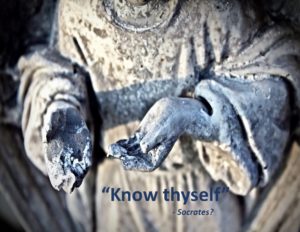The traits of leadership are often listed as characteristics such as integrity, confidence, vision, communicator, etc. Seldom do we see on these lists of important characteristics the trait that is foundational to them all – self-awareness. Self-awareness is defined as the conscious knowledge of one’s own capabilities, character, feelings, motives, and desires. It can also be described as the ability to know oneself deeply and to act from that knowledge.

The self-awareness that we are speaking of here is personal self-awareness. One of the domains of emotional intelligence is termed emotional self-awareness. EQ self-awareness is a subset of personal self-awareness, which is a broader knowledge of who we are.
Self-awareness can be considered on a spectrum or scale. We probably have met people and later thought that “they haven’t a clue” because they seem so unaware of themselves or aren’t in touch with reality. On the other end of the spectrum are those people that are very comfortable in their own skin, those who are highly self-aware. We cannot be perfectly self-aware because everyone has a few blind spots or things that are buried deep inside them. Even though we can never be completely mindful, highly effective leaders are highly self-aware.
What does it mean to be self-aware? The people who have a clear perception of themselves can agree to a great extent with most of the following statements:
- I know my strengths in the areas of intelligence, skills, and technical and functional knowledge.
- I know my weaknesses in the areas of intelligence, skills, and technical and functional knowledge.
- I am aware of my emotions and able to manage them.
- I know my emotional triggers.
- I understand my interpersonal strengths and weaknesses.
- I can differentiate myself and what I am feeling from those around me.
- I understand the boundaries where my responsibilities end and the responsibilities of others’ begin.
- I am aware of my intuition and know the situations where I can trust it.
- I am able to understand and accept the reality of my personal situation.
- I am able to understand the cause and effect of circumstances in my life.
- I am clear on my motives and desires in life, in relationships, in work, etc.
- In addition to my own perspective, I am able to see myself as others see me.
- I know roughly where I am on the scale from “haven’t got a clue” to completely self-aware.
- I recognize most of my blind spots and areas for development.
- I am continually striving to become more self-aware.
(Download our self-awareness assessment worksheet to evaluate your own self-awareness.)
High self-awareness is a strong predictor of success as a leader. This mindfulness lies beneath a person’s self-confidence, ability to be vulnerable, skill at managing relationships, ability to delegate, self-discipline, and many other elements of effective leadership character and competency. The less clarity we have about ourselves, the more likely that we will stumble along the way.
How does a person grow in self-awareness? To develop a thorough understanding of ourselves requires that we are consistently looking inside ourselves and asking the question, why? We are seeking to know what lies within us and what drives us. To answer these types of questions, assessment tools such as Myers-Briggs, DISC, etc. can be helpful. Seeking the input of those around us with tools such as EQ360 can help to see through the blind spots or provide perspective. Journaling can be helpful in thinking through the “why” question as a person tries to understand themselves more fully. A trusted friend, advisor, therapist, or peer group can help us in digging deeper into who we are and why we operate or behave in certain ways. To be self-aware means to be continually developing our self-awareness, so these tools should be frequently re-visited.
What might be other descriptors of self-awareness? How are you growing in your own self-awareness?

1 Comment
Add your comment